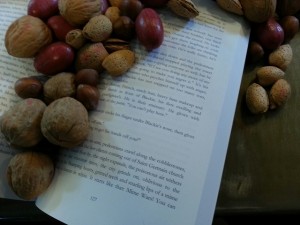 There are a million ways to write a book and another million ways to edit it. All those possibilities can prove more than daunting; they can prove paralyzing. Thankfully, your perspective as a writer narrows down that list. So as you sift through everything from your ideas to your reading, note your observations. Are certain themes popping up? Have you found other ideas to explore?
There are a million ways to write a book and another million ways to edit it. All those possibilities can prove more than daunting; they can prove paralyzing. Thankfully, your perspective as a writer narrows down that list. So as you sift through everything from your ideas to your reading, note your observations. Are certain themes popping up? Have you found other ideas to explore?
This is what I call the nut-and-berry gathering phase. Whether you’re tackling a nonfiction tome or trying to identify who’s going to populate your novel, short story or memoir, you need to embark on this idea-forming, information-gathering phase. After you bring all your initial finds back to the cave (in this case your mind), sift through the lot to see what you’ve got, how your ideas play together and how you might be able to group them.
Once you’ve got enough nuts and berries and whatever else you’ve gathered along the way to figure out whether you’re baking bread, roasting a chicken or blending a smoothie, crafting a rough, preliminary working outline (triple redundancy intentional) will help focus your thoughts. This outline can be super short—just a handful of words per topic. A Writer’s Coach author Jack Hart calls this the jot outline.
Next organize all that material you’ve unearthed along with all those thoughts you’re birthed according to that working outline. You will likely shift everything around a couple, three times, but at least you’ll have a handle on your book by then and won’t feel overwhelmed by too many options. And that will help you sidestep writing paralysis.


Sorry, comments are closed for this post.